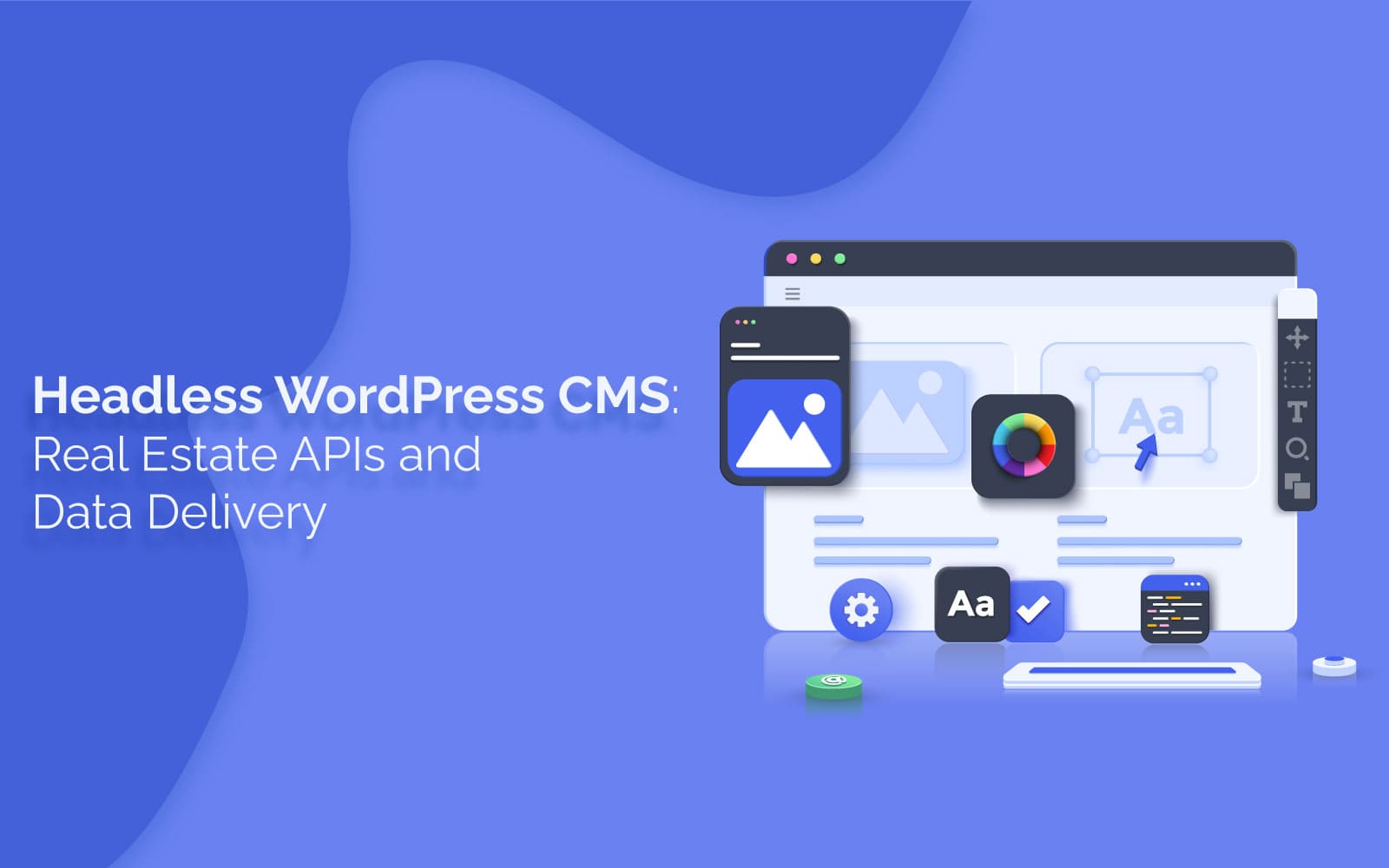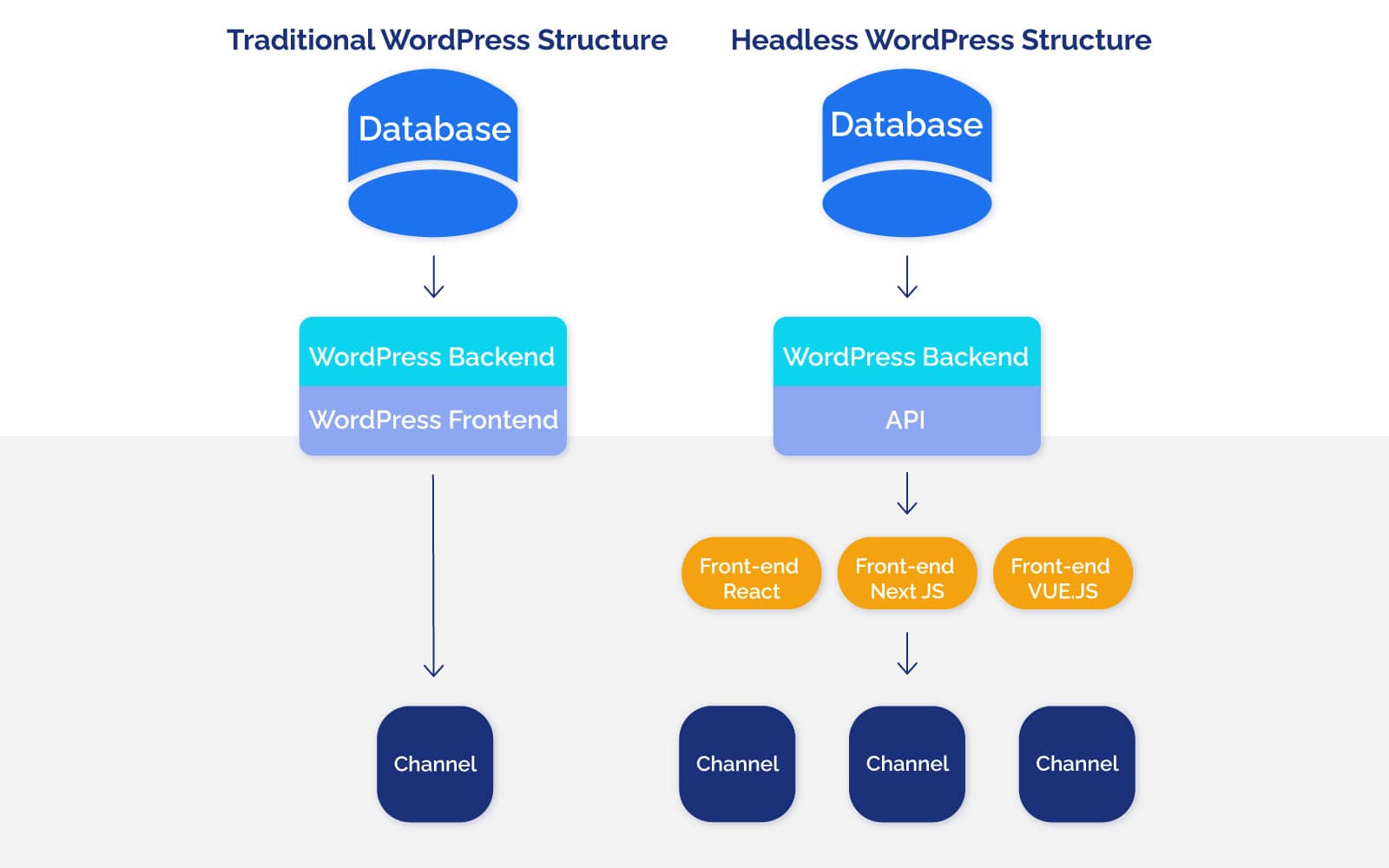
Headless WordPress CMS: Real Estate APIs and Data Delivery
Over the past years, we’ve relied extensively on CMSs. However, times have changed. Today’s mobile era has witnessed a rise in the use case of communication channels like the internet, virtual reality, digital assistants, and bots. The question is, is your content management system (CMS) prepared for this shift? Websites have long depended on traditional CMSs for the convenience of having all content, editing interface templates, and bespoke code in one place. But is that enough?
How Does Headless WordPress CMS (API) Work?
The front and back end are the two components that make up a website. They are the head and the body of each website. The front end refers to the interface that users see and use to engage with the site, while the back end is where the site stores all its data and codes. As a rule, in a conventional WordPress unified system, the back and front end are written in the same language and framework and tightly integrated. The drawback of this approach is that:
- In the absence of an API, their content is limited to the web and cannot be easily reused in other contexts, such as for a mobile app or kiosk.
- They require developers to work with a specific coding language. A good number of developers feel that it would be preferable to have the option to use their preferred language.
- The fact that they depend on the display layer makes it limited in presentation and the user experience they can offer.
Headless CMS, in other words, is a tool that allows flexibility and multi-tasking for websites while offering spotless content with high security and super fast speed. So real estate website owners can present several high-quality web pages for their users within shorter times with better security and overall great experience.
Content created now can be viewed on any device in any format. Although conventional CMSs were not intended to handle such a scenario, the demand has risen for a new type of CMS that can make material accessible via any channel. Now it is easier for users to get data. Even better, real estate professionals or webmasters can easily integrate their websites with mobile applications and other channels, hence, the need for headless CMS.
When using a headless CMS, you can keep your attention where it needs to be: on the data itself and how to get it to your audience through your preferred delivery channels. One fun fact about this process is that the presenting software does not interfere with your work. It is significantly better because it simply delivers data to its application’s programming and user interface.
Your content is made accessible through any platform and on any device using the API. With API, any programming language can be used to create a website for mobile applications, and you can still use your preferred tools and development workflow. Additionally, it offers far better scalability and a higher level of security. Theoretically, any conventional CMS might be transformed into a headless one by just including an API. Nonetheless, CMS maintenance remains a priority.
Benefits of Using Headless CMS (API)
One of the major benefits of API is that a CMS can be completely detached, deployed on the cloud, and still offer a variety of data through different heads. And with a cloud-first headless CMS, you can use both the best in headless with all the advantages of the cloud.
You can have peace of mind knowing that the CMS provider takes care of your website’s or app’s availability, security, and performance. Publish content to the web, mobile apps, and other platforms and devices with the help of your cloud-first headless CMS. It enables you to direct your energy on what really matters – providing an excellent digital experience for your customers.
#1. High-quality Cross-Channel Interactions
The original purpose of a content management system was to manage websites, and this served its purpose adequately at the time. But as technology started to move away from desktop and mobile into other gadgets like smartwatches, voice-command devices, and other technologies, new delivery layers had to be developed, which increased the difficulty of content uploads for both developers and marketers. However, using a headless CMS (API) helps to avoid the monolithic operation of the standard CMS system where marketers and developers provide data to users across multiple platforms.
Take RESO Web API, for example, real estate professionals can easily upload, integrate, maintain, and update MLS and IDX data on their web pages without involving developers thanks to the decoupled modern system of the platform. This not only speeds up the delivery process but also allows non-technical consumers like real estate agents to have more control over their content.
Thanks to the API, listing duplication across servers is now completely unnecessary. Real estate agents and Realtors no longer have to copy single listings between servers. Participants, vendors, and MLSs can all benefit from the time savings that API technology provides when it comes to collecting and using MLS data.
#2. Flexibility of Content Management System
Since the interface is decoupled from the content, headless CMSs offer the benefits of both standard CMSs and headless architectures in a single, unified platform. Businesses can select the CMS approach that works best for them, whether that’s a more conventional one, a headless one, or a hybrid of the two. Although a fully headless CMS makes it possible to deliver content to any presentation layer, it may be difficult for non-technical marketers to get up to speed due to a lack of familiar editing features. However, this can easily be resolved for real estate marketers when they use experts in the field like Realtyna.
#3. Effectiveness and Rapidity for Programmers and Marketers
One thing that makes Realtyna’s open headless CMS even more worthwhile is that it eliminates the inefficiencies of proprietary systems, freeing up valuable time for both developers and real estate marketers. Because it is API-driven, you can easily create your presentation layer and front end using the language of your choice. Without needing to adjust their methods to work with a restricted, proprietary platform. Developers are free to create software in the way they are accustomed to.
Also, projects can be completed faster since the same content can be used in multiple presentation outputs. A headless CMS can be safely integrated into any preexisting infrastructure.
#4. Support for Programmers
The development of Realtyna has continued to evolve, as evidenced by its incorporation of headless APIs for out-of-the-box services. There is no need for front-end developers to learn new tools or frameworks to create websites. In addition, they have unprecedented leeway in deciding how, when, and where to incorporate Realtyna’s APIs across all systems.
#5. A Low-Cost, Future-Proof Alternative
Headless allows teams to flawlessly construct new websites and add new functionality to existing websites and portals much faster. So, you’ve decided to launch a marketing campaign, and as part of it, you want to launch several landing pages showcasing your latest offers. Without waiting for developers to create templates, your team could immediately enter the headless CMS and begin developing the pages. Instead of beginning with a massive web development project, you can start small and develop a number of different solutions, reducing your initial costs.
Other benefits of using a headless CMS include the following:
- Headless CMSs are useful for generating best-practice environments with high security and reliability.
- A headless CMS allows teams to focus on creating valuable content rather than putting all their efforts on very expensive and lengthy development processes.
Get to Know About Real Estate APIs for Real Estate Marketers & Developers
RESO Web API: When it comes to transferring data in the real estate market, RESO Web API is the cutting edge method, developed using open technology standards that can be used by real estate companies for transferring and receiving MLS data.
MLS API: This API offers a novel approach to integrating property listing database on your website, allowing seamless API connection to the MLS. One thing that stands out with the MLS API is its flexibility. Your website’s functionality is entirely in your hands. Additionally, optimized search engine results can be achieved through your hosting preferences when using MLS API.
WPL API: Through Realtyna’s API Plugin, you can connect your own program to the WPL infrastructure. Additionally, WPL API also makes use of RESTful HTTP technologies, which flawlessly helps your real estate website transfer and integrate MLS and IDX data.
RealtyFeed API: RealtyFeed is a global social network for real estate professionals. Inbuilt with MLS and IDX solutions, the cloud-based platform is design to aid real estate agents access, share and market their listings without hassle. Through the platform, Realtors can own personalized downloadable mobile applications that come with a QR Code generator tool.
Yelp API: Through Yelp API, agents can publish reviews and marketing data about their neighborhoods. Using Realtyna’s Yelp Integration plugin, real estate professionals can access and publish neighborhood information and ratings directly on their websites.
Bottom Line
In the rapidly evolving digital landscape, platforms can become outdated very quickly, therefore, knowing that a headless CMS like RESO Web API, RealtyFeed API, WPL API offer the ability to prospect your apps by separating the interface from the data and logic layer is very reassuring. As a result of this flexibility, it is simpler to rebrand new initiatives across channels as needed. Also, you can organize and restructure your data at any time.
Read more about real estate APIs in the articles below:
- Understanding RESO Web API in Simple Terms
- How Is IDX Different From RESO Web API?
- How RESO Web API Can Be the Backbone of a Successful MLS Provider?
- Headless WordPress Website with React
You can view a list of Realtyna’s APIs here:



Sorry, the comment form is closed at this time.